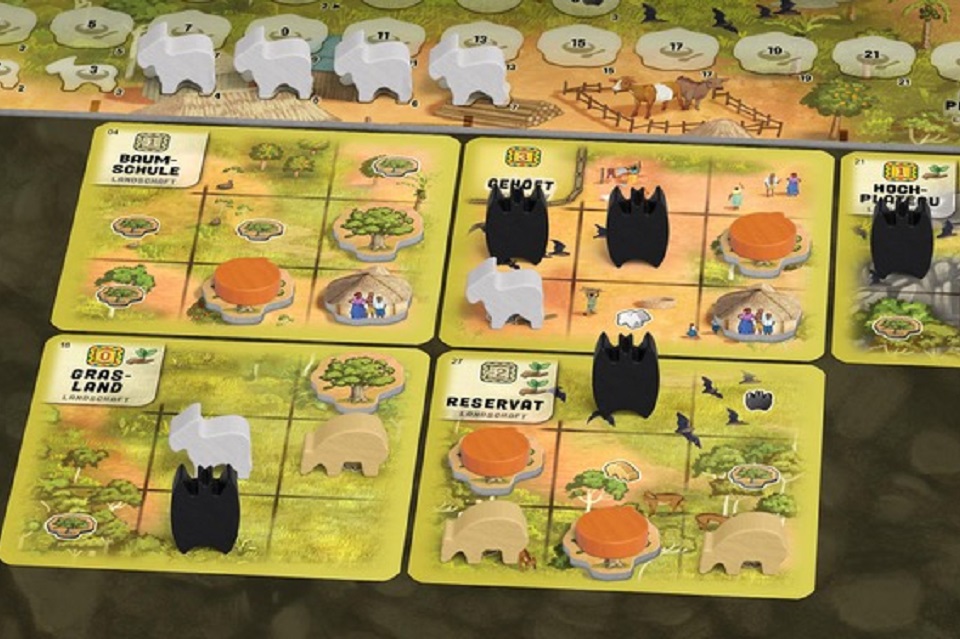
Uwe Rosenberg tells about the beginnings of the game development and what will follow.
History of the development of Atiwa
Even before the pandemic, he was concerned with the importance of flying foxes for reforestation. This inspired him to create the game Atiwa.
Then the pandemic broke out and he used the period of “downtime,” as he calls it, to do more research on Ghana. He used these new findings to develop more games.
That’s why it’s no surprise that all the games are set in Ghana. For Uwe Rosenberg Ghana is one of the most diverse countries on earth and in his games he deals with topics and problems of this country. Whereby he emphasizes that the problems are not necessarily chosen by the country itself.
When he played the game with his 7-year-old son, he summarized the game as “flying foxes pooping trees.” At that time, however, the game was still called “Kibi.”
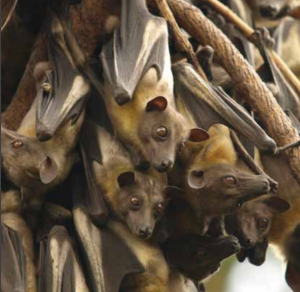
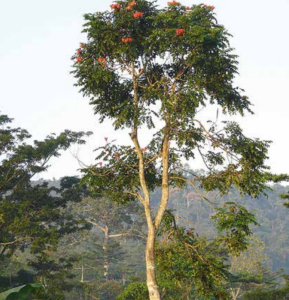
Further game ideas
Topics that inspire Uwe Rosenberg for further games.
Energy management
In the game, heating is still done with charcoal. However, the idea of getting away from charcoal in the long run is an area for another game.
Agriculture
Other topics for a new game are lagoon management, the reservoir in Ghana and agriculture in the savannah. Uwe Rosenberg would like to combine the topics of lagoon management and reservoir together.
There are already advanced designs for the themes of mining and the combination of plantations and ecotourism.
The mining game is about plants detoxifying the soil, with investors being the enemies.
In contrast, the plantation game is about managing your own plantations. The goal is to degrade the plantations and use the land in a sustainable way. However, you must always take into account that you have to make a living for your family.
It is especially worth mentioning that the games are all set in the present or recent past. Uwe Rosenberg points out that game creators in the 90s mainly put out games with a medieval genre.
Nowadays, themes from the present that also deal with serious issues are nothing unusual.
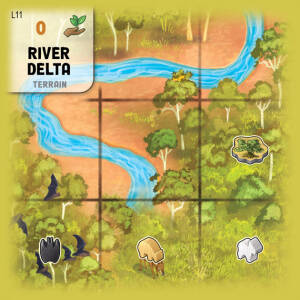

Together
Another common element between the games is that the goal is to improve the lives of people in West Africa.
Uwe Rosenberg points out that this is not so easy, due to the aftermath of colonization.
In addition, he focuses more on togetherness and talking to each other.
Accordingly, one of his key sentences is: : “Eye level is established in a flash when everyone involved in the conversation is more interested in what the others are saying than in what they themselves want to say.”
He wants people to have more in-depth conversations and, above all, to listen to each other.
Atiwa, the Lookout Game
Atiwa is set in West Africa, Ghana to be precise. In a village on the edge of a nature reserve that provides clean drinking water, your task is to generate wealth.
It is therefore set in a region that is ecologically very valuable.
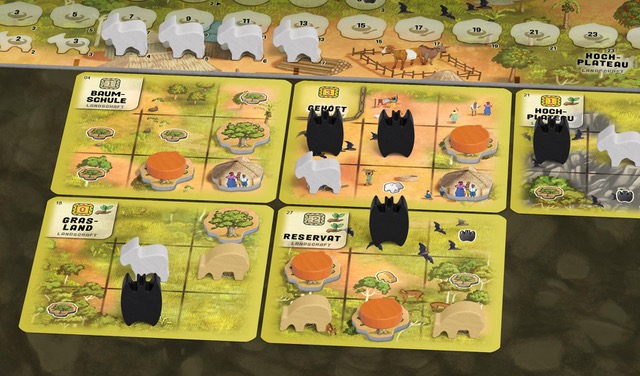
The rainforest
The name Atiwa comes from a range of hills in southeastern Ghana with the same name. This is a 17,400 hectare forest reserve. This is a high altitude evergreen forest rarely found in Ghana.
This region is home to numerous beautiful and endangered species. In addition, its water sources provide drinkable water to 5 million people.
Unfortunately, this valuable area is threatened by bauxite mining, bushmeat hunting and deforestation. Aspects that can also be partially found in the game.
Game content
As fruit farmers, players learn to consider and use the palm flying dogs, technically Eidolon helvum, as useful allies.
The animals eat some of the cultivated fruits at night, but at the same time they spread their seeds over wider areas.
This makes them great helpers in the reforestation of fallow land. In addition, they participate in the medium term in the increase of harvests.
Thus a symbiotic cooperation between the flying foxes and the fruit growers occurs.
In addition, fruit growers provide shelter for the fruit bats, which results in a faster increase of the cultivated area.
However, many fruit bats also need a lot of space.
The goal of the game is to create a balance between flying foxes and the growth of your own settlement. The better you succeed, the more likely you are to win.
About the general facts of the game:
Atiwa uses the worker placement mechanism and includes over 300 wooden meeple, such as flying foxes, in addition to many cards.
It is designed for 1 to 4 players and is playable for ages 12 and up. In addition, the game is a KENNERSPIEL.
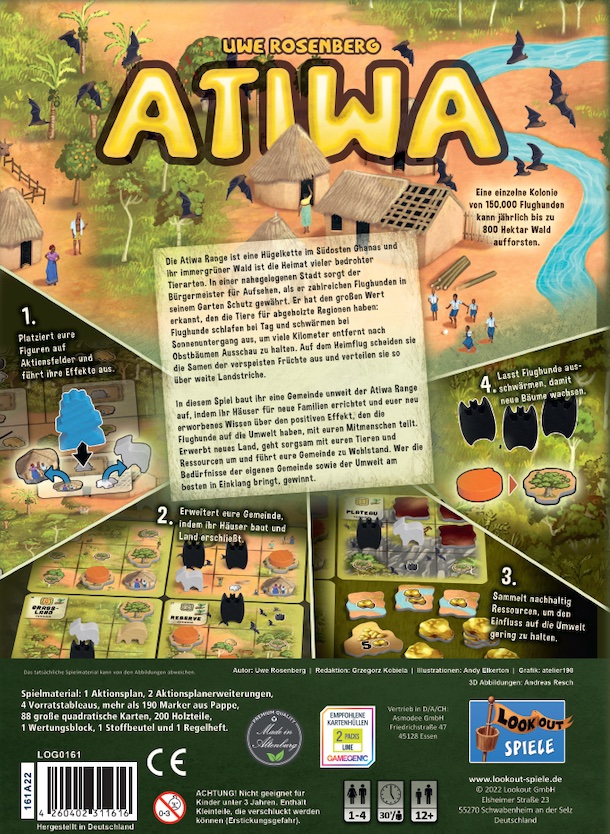
What about the ecological footprint of Atiwa?
The more than 300 wooden meeple are made from renewable raw materials, such as paper, cardboard and beech wood. In addition, the game is printed and assembled at Lookout Spiele partner ASS Altenburger in Germany.
Thus, the game not only draws attention to the positive co-creation of the present, but is even itself part of a positive change.
The development of a game is always an achievement of many participants
For example, Atiwa illustrator Andy Elkerton was able to develop the typical Ghanaian landscape with the help of Uwe’s Ghanaian contacts and cultural anthropologists.
Consequently, the huts correspond to the local models on the ground and there are no consolidated paths in the village.
The graphic representation of the flying fox meeple was done by Klemens Franz.
If your interest in Ghana, the game or palm fruit bats is still unsatisfied, there is more information on these topics in the accompanying booklet, which is enclosed with the game.
In addition, more games by Uwe Rosenberg from this subject area will follow.
Atiwa
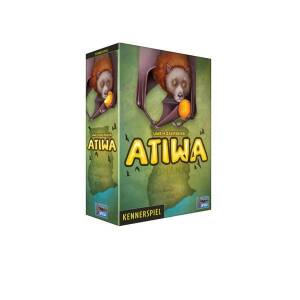
- Number: 1-4 players
Age: from 12 years
Duration: 90+ minutes
For more informative articles from Lookout Spiele, check out your well-stocked specialty magazine store, where you’ll find the “Neues im Ausguck” magazine.
Find out exciting news and more about our products every week at varia.org/blog !

